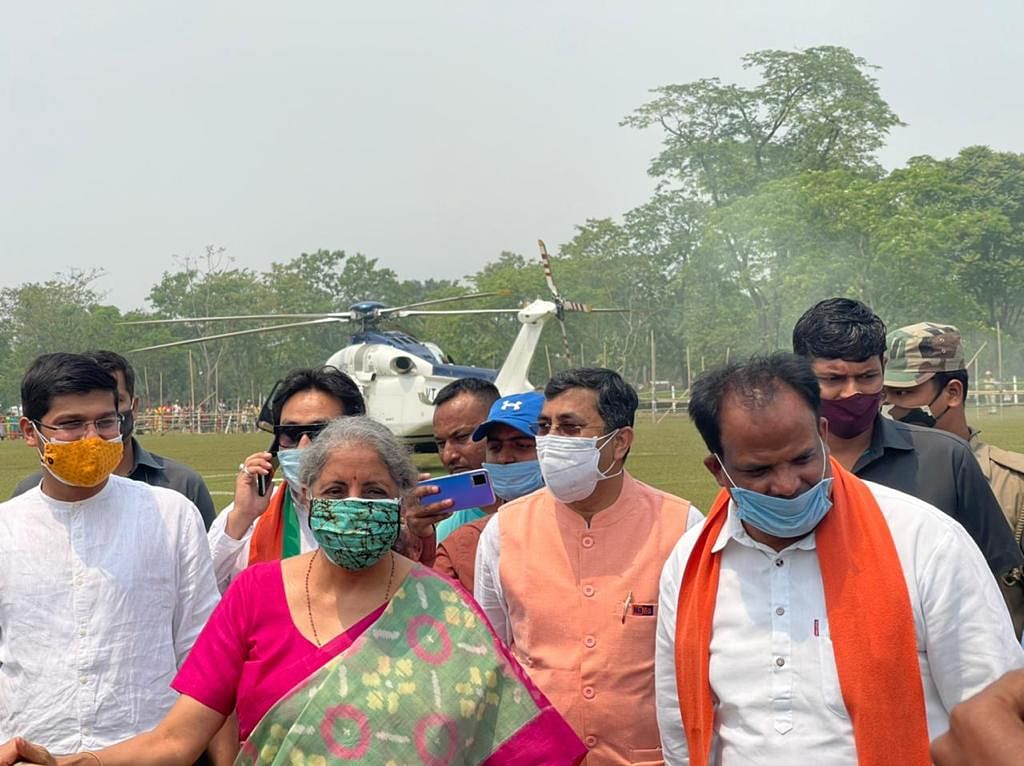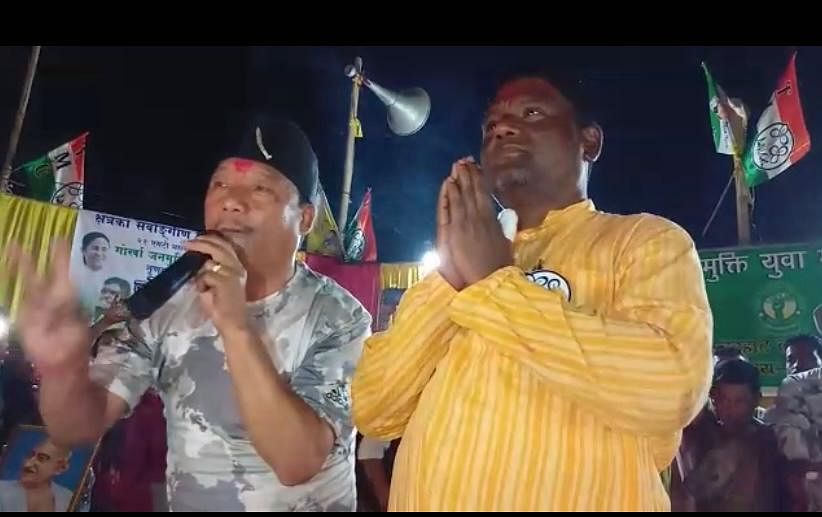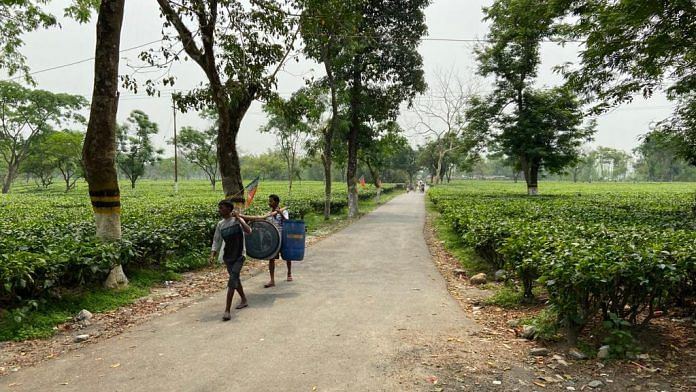Dooars, Jalpaiguri: “Amio Ekjan Chaiwala (Even I am a chaiwala)” was Prime Minister Narendra Modi’s opening line during an election rally in North Bengal’s Siliguri on 9 April.
There was little doubt at whom the carefully crafted lines were aimed at. There are 408 tea gardens in the three districts of Darjeeling, Alipurduar and Jalpaiguri — and their workforce, comprising the hill tribes of Gorkhas, Mundas and Oraons, are key to 16 assembly seats in this part of North Bengal.
Once dedicated voters of the Left parties who recently swung in favour of the BJP in the 2019 Lok Sabha polls, tea garden workers are now keeping the two major parties, the ruling Trinamool Congress and the BJP, on tenterhooks.
Thirteen of these constituencies are voting today, while three have already voted.
While the BJP is looking to consolidate its Lok Sabha performance in the region, the Trinamool has announced a host of welfare schemes to woo the populace.
Of the 408 gardens, 84 are in the hills and produce the finest variety of premium tea leaves, internationally branded as ‘Darjeeling tea’, while the remaining 324 are in Terai and Dooars regions. The gardens in the Dooars produce CTC (crush, tear and curl), inexpensive but a popular variety of tea.
The tea gardens have traditionally been a Left bastion but the Trinamool made inroads in the 2016 assembly elections, winning eight of the 16 seats. It lost all of the gains in the 2019 Lok Sabha polls, when the BJP led in all 16 assembly segments here.
In these elections, however, voters are giving little away despite a concerted effort by both the BJP and the TMC to woo them.
Also read: How Gorkha factions, new Mamata ally & BJP have kept cry for Gorkhaland out of the hills
Mamata’s doles
Even though the BJP appears to have an edge as its Bharatiya Tea Workers Union, backed by the RSS, has a hold in 199 of the tea gardens, Chief Minister Mamata Banerjee has been relentless in her pursuit to make fresh inroads here.
Her government has over the past year, launched a number of schemes for the tea garden workers.
In February this year, her government introduced a scheme, ‘Chaa Sundari’, for approximately three lakh permanent workers on the rolls in 370 of the tea gardens registered with the state’s labour department.
As part of the scheme, within the next three years, the government will provide funds for the construction of houses for all the permanent tea garden workers who do not have a house of their own.
The chief minister, in her budget speech this year, said Rs 500 crore has been allocated for the scheme in the 2021-22 fiscal. She also claimed to have reopened at least 14 closed gardens that are now run by the cooperatives.
“Didi has saved the tea gardens in North Bengal. There were so many starvation deaths in the closed gardens. Our government took over at least 14 gardens and is running them through cooperatives,” Rabindranath Ghosh, the North Bengal Development Minister, told ThePrint. “Our government is already providing rice at Rs 2 per kg, free electricity, health benefits, mid-day meals for their school-going children and many other benefits. Many of these workers though do not have a house to call their own due to their poor economic condition. With this in mind, Didi has introduced the Chaa Sundari project.”
“I had on Wednesday visited at least eight tea gardens run by the cooperatives,” he added. “I spoke to the workers. None of them complained of anything.”
BJP leaders, however, are claiming that the tea gardens are still closed, and accused the Trinamool Congress of “bluffing” the tea workers.
“The government has appointed financiers for 14 gardens. But the gardens remain closed because the PF accounts of the tea workers were not activated. They are not getting regular wages,” Alipurduar MP John Barla of the BJP told The Print. “Basic facilities like drinking water, electricity and health are still unavailable. The workers are migrating to different states as labourers.”
Barla, who is the president of the Bharatiya Tea Workers’ Union, added that Union Finance Minister Nirmala Sitharaman flew down to Siliguri on 14 April, met the tea workers and promised a hike in their daily wages.

“The government has to hold meetings with garden owners and reach a consensus on the wages. We have started the discussion, but the state has to be in sync. We have never got any cooperation from Mamata Banerjee’s government,” Barla said. “The trade union leaders understand how the wage pact works. It is a three year contract between workers or the unions and the owners.”
He added: “In Bengal, wages were revised in 2015 and six years later in 2021. After six years, wages went from Rs 176 to Rs 202. Only Rs 26 was increased in six years. I raised the issue of arrears. All workers should get at least Rs 30,000 as arrears for the past three years, when the revision process was put on hold.”
The BJP had in 2019 promised that the central government would take over and run at least 10 closed gardens.
“The Centre wanted to take over but the state is not cooperating,” Barla claimed, adding that the region now has around 19 closed tea gardens, a situation that affects at least 60,000 workers and their families.
Modi, while addressing meetings in the region, announced at least Rs 150 hike in the daily wages for the tea garden workers.
The BJP’s election manifesto has promised to “ensure parja patta (land patta) rights to those living in tea gardens, wages of Rs 350 per day and to recognise 11 Indian Gorkha sub-tribes as Schedule Tribes”.
Tea-workers remain non-committal
Despite all of this, the tea workers, who voted en masse for the BJP in 2019, are weighing their options in these assembly elections.
“Before elections, all political parties reach out to us for votes but for the rest of the time, no one remembers us. There have been so many starvation deaths among our relatives and friends,” said Sunil Oraon, a tea worker at Ellenbarrie tea estate in Malbazzar assembly constituency. “Our wages were revised after six years. In some gardens, payments are regular, in some gardens payment comes once in three months. We as a community will take a call about voting this time.”
Buddhiman Tamang, a 55-year-old worker in the Red Band tea garden at Banarhat, said his garden has been closed. “Our garden has been closed for over 20 years now. No government — Left or Trinamool — took any initiative to open it,” he said. “In 2019, the state government said it would run the gardens through a cooperative system but we did not see anything happening. We go out for work. Some of us break stones at the nearby river bed, and some have migrated to states like Kerala, Delhi, Tamil Nadu, Karnataka to work as construction labour.”
Raghu Murmu, another worker, said: “Government started giving us free ration. But that has become irregular now. The hospitals are closed, we do not have any health services here. In the past 10 years, no work has been done inside the garden. One can see the road condition and living condition. This is no less than hell.”
Both parties, however, see openings.
According to a senior Trinamool Congress leader, the party has tied up with Bimal Gurung’s Gorkha Janmukti Morcha, which has reasonable support among the Gorkha population in the tea gardens. Gurung has campaigned for Trinamool candidates in the Dooars region.
“In 2019, there was a ‘hawa’ in favour of BJP. This time, it is for us,” said Joseph Munda, the Trinamool candidate at Nagrakata. “We have regained our lost ground. Once we win the elections, there will be development work.”
Munda claimed that he also had the support of major tribal organisations such as the Sarna Adivasi Organisation and Adivasi Vikas Parishad.

The BJP too is confident.
“In my constituency there are 40 tea gardens but eight of them are closed. Tea gardens in Assam are probably in a better condition because the government fought for them with the owners,” said Puna Bhengra, the BJP’s candidate at Nagrakata and a retired BSF officer. “If we are voted to power, we will be able to do the same as the centre and state will be on the same page.”
(Edited by Arun Prashanth)
Also read: Who are Rajbanshis, caught in Shah-Mamata scrap & why they’re key for BJP in Assam, Bengal



